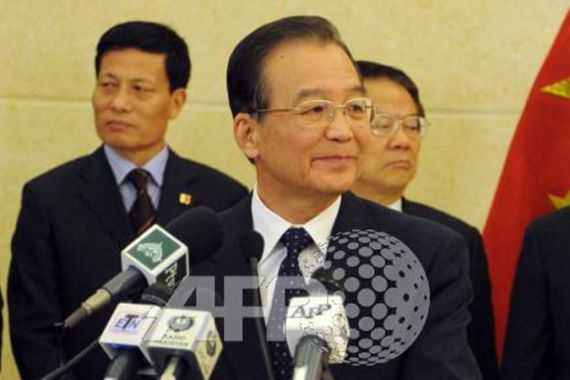China’s Wen asks people to speak up
Meeting with farmers and workers seen as a rare public show of concern about discontent with the government.

 |
| Wen met people condemning land grabs and unpaid wages during a visit to China’s highest petition bureau [EPA] |
Wen Jiabao, the Chinese premier, has been quoted by the state media as urging citizens to voice their criticisms of the government and speak out about injustice during a visit to the country’s highest petition bureau, where people are allowed to file complaints against officials.
Wen met farmers and workers condemning land grabs and unpaid wages among other complaints at the State Bureau for Letters and Calls in Beijing, official media reported on Wednesday, in a rare public show of worry about discontent with the government.
“Please don’t hold anything back, and give me the facts,” Wen told the people, according to a report on the central government’s website.
“Our government is a government of the people, and our power is granted by the people.”
The official Xinhua News Agency said late on Tuesday that it was the first time since the founding of the People’s Republic of China in 1949 that a premier had met ordinary petitioners.
China Central Television quoted Wen as telling visitors and staff at the bureau on Monday afternoon that the government must “create conditions that allow citizens to criticise and supervise the government, and enable government to responsibly resolve the problems and difficulties of the masses”.
Human rights
Millions of petitioners visit government offices across China every year to demand redress and are often treated by officials as an embarrassing nuisance, even a threat to control, despite rules that say they should be given a hearing.
People with complaints are often held in a government-run centre in Beijing to be sent home, or detained in illicit “black jails”.
Al Jazeera’s Melissa Chan, reporting from Beijing on Wednesday, said petitioners in some cases have been punished and even committed to mental institutions even though there was nothing wrong with them.
“To our knowledge this is the very first time for anyone from the top leadership to have stepped onto the street and try to speak to these petitioners directly,” she said.
Wen has won widespread public affection in China by casting himself as a servant of the people, and he pressed that role again by meeting people who journeyed to Beijing to demand a hearing from central officials at a special petitions office.
But Wen’s meeting with petitioners amounted to an unusually blunt acknowledgement that China’s feverish economic growth had also brought discontent, especially over land confiscations, harsh work conditions and scant support for the many poor people.
“This may be the first time a central leader has done this. Even minor officials usually stay away from us,” Liu Anjun, a veteran petitioner in Beijing who has run a support group for complainants, told the Reuters news agency.
“It may be staged, but it’s a signal to people. It may be related to Hu Jintao’s visit to the United States, which strengthened the focus on human rights. The petitioners reflect all the most basic human rights problems in China, and Wen may want to show that at least he’s concerned.”
Wary of dissent
China is extremely wary of dissent. The government does not allow protests and routinely censors the media and internet of any content that is potentially destabilising or overly critical of the leadership.
Outspoken critics of the communist regime, including Nobel Peace Prize winner Liu Xiaobo, have been jailed on vague subversion charges.
Wen has spoken before about giving the public greater freedom to voice anger and frustration over social problems such as corruption. The comments have been interpreted by some as a signal that the leadership wanted to more aggressively pursue democratic reforms, but they have yet to be followed up by concrete initiatives.
Last week, after a White House summit with Obama, Hu defended his government, but said a lot still needed to be done in terms of human rights.
Wen survived the ousting of his reformist boss Zhao Ziyang after a pro-democracy movement was crushed in 1989, and has stood out as the official most forthright about the long-sensitive issues of political reform.
Last year, he said the government must rein in abuses or risk sacrificing the gains of growth to “regression and stagnation”.
Wen will retire as premier in early 2013.